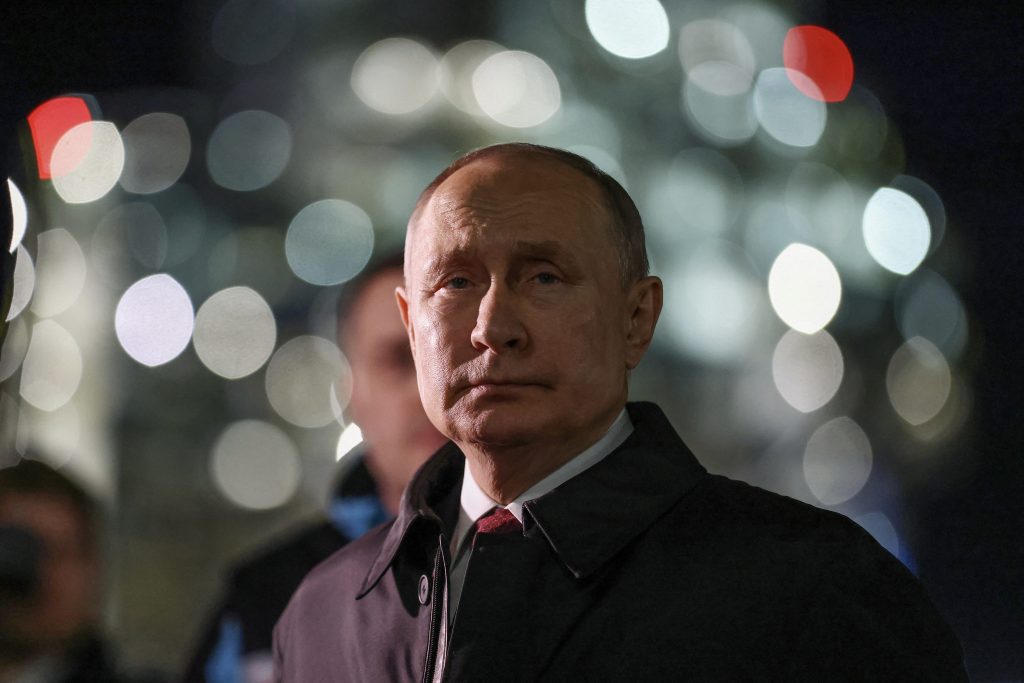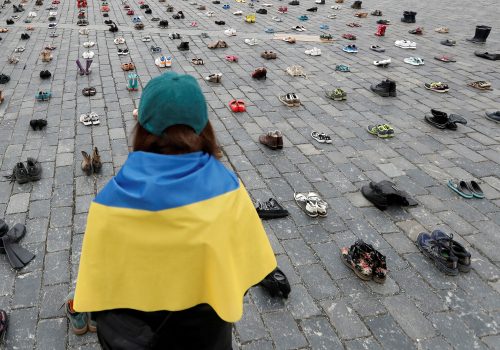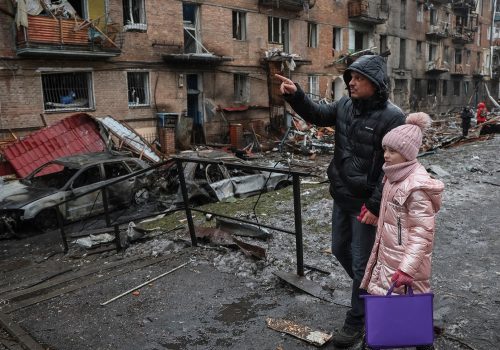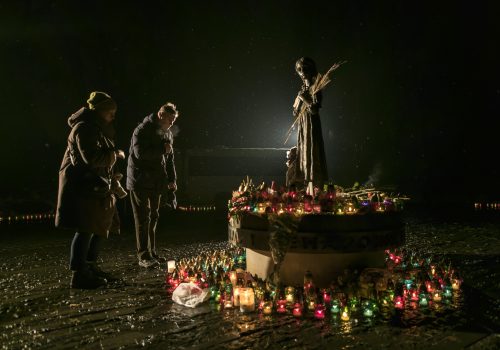On November 16, international human rights law firm Global Rights Compliance (GRC) released a report alleging that, months prior to Russia’s full-scale invasion of Ukraine, Russian forces engaged in a “highly coordinated level of pre-planning” to weaponize Ukrainian grain. The new evidence suggests that these preparations—including the procurement of trucks and cargo ships to carry extracted grain—are part of a “broader, systematic strategy” to seize Ukrainian grain and transport it to Russia. GRC announced that it will be submitting its evidence to the International Criminal Court (ICC) in the hope that Russian President Vladimir Putin will be prosecuted for the war crime of starvation.
GRC’s findings came shortly before Holodomor Remembrance Day. Between four and seven million people died during the 1932-1933 Holodomor, which translates to “death inflicted by starvation.” This was a man-made famine, resulting from policies implemented by Communist Party General Secretary Joseph Stalin’s Soviet government to seize control of Ukrainian farmers’ agricultural resources. Various states and international authorities have recognized it as a crime against humanity and/or a genocide, including the Kyiv Court of Appeal, which determined in 2010 that Stalin and six others were guilty of genocide but closed the criminal proceedings due to the defendants being deceased.
Following the onset of the full-scale invasion of Ukraine in February 2022, Russia was accused of weaponizing starvation against Ukrainians using various methods, including through its destruction of grain warehouses and during its siege of Mariupol. However, more recent allegations additionally warn that the impact of Putin’s starvation tactics could extend further.
GRC found that Russia’s campaign could constitute the crime of starvation not by depriving Ukrainian civilians, but by harming food-insecure civilian populations “in third-States for whom the grain was destined.” Indeed, the grain in question was largely intended for export, including “to some of the most food insecure regions of the globe such as the Horn of Africa, the Sahel, Yemen, and Afghanistan.” In 2021 and 2022, Ukraine supplied more than half of the United Nations World Food Programme wheat grain. A similar argument was raised earlier this year after Putin’s withdrawal from the Black Sea Grain Initiative—a deal that allowed Ukraine to safely export grain through the Black Sea. While the Russian government has issued statements attempting to refute accusations of wrongdoing, such as disrupting food supplies to third party states, the statements have generally been disproven.
The ICC has yet to prosecute the war crime of starvation and experts refer to it as “a war crime never yet punished”—despite historic and recent and ongoing examples of its commission. The initiation of such a prosecution against Russia is therefore critical for two reasons. First, it will help capture the full scale of Russia’s atrocities—and ensure that all victims receive accountability. Second, it will help develop international practice in identifying and prosecuting starvation as a war crime, shaping the case law that will help the ICC and other courts address other instances of this crime.
Would this submission fall under the ICC’s Ukraine investigation?
Neither Russia nor Ukraine is party to the Rome Statute, but Ukraine has accepted ICC jurisdiction over war crimes, crimes against humanity, and genocide committed within “any part” of Ukrainian territory since November 21, 2013. In February 2022, ICC Prosecutor Karim A.A. Khan opened an investigation into the situation in Ukraine.
Under Article 8(2)(b)(xxv), the Rome Statute considers “intentionally using starvation of civilians as a method of warfare” in the context of an international armed conflict as a war crime, provided that the perpetrators deprived civilians of “objects indispensable to their survival.” As listed in Additional Protocol I to the Geneva Conventions, crops and “agricultural areas for the production of foodstuffs” are among these objects. For international armed conflicts, the Rome Statute does not specify whether “civilians” includes residents of states not party to the conflict in question. The Fourth Geneva Convention only guarantees general protections under Part II for nationals or those “in the populations of” states party to a conflict. However, Additional Protocol I broadly defines civilians as being noncombatants, without mention of nationality or residence.
Alternatively, while there is no crime against humanity that specifically covers starvation in the Rome Statute, Article 7(1)(k) provides for the crime of “other inhumane acts,” which may apply if the perpetrators’ actions are “of a similar character” to the other crimes against humanity listed under Article 7(1). The effects of starvation likely meet this standard.
By definition, starvation in third states would not occur within Ukrainian territory. However, the ICC may still have jurisdiction to the extent that Russia’s acts preventing Ukraine’s planned exportation of food—such as the destruction of agricultural machinery and diversion of crops to Russia—occurred in Ukraine. Alternatively, the ICC could open new investigations into the situation for any states that were intended recipients of exports and are parties to the Rome Statute.
If the ICC opts to pursue cases related to starvation as a war crime or crime against humanity, Putin could be subject to indictment along with any officials or Russian military personnel involved in the weaponization of Ukrainian grain. Even if Putin claims no direct involvement in planning or carrying out the crime, he could still be held liable under the principle of superior responsibility. This is codified in Article 28 of the Rome Statute, which allows liability for failing to “prevent or repress [subordinates’] commission” of a crime. However, Putin would need to have had effective responsibility and control over the actions that “[t]he crimes concerned,” and he would have had to have “kn[own], or consciously disregarded information which clearly indicated, that the subordinates were committing or about to commit such crimes.”
How does the new evidence affect the legal analysis of Russia’s actions?
GRC’s report offers critical evidence that relates to the mens rea, or mental element, of the war crime of starvation.
Article 30(2) of the Rome Statute requires two elements of intent: intent to “engage in the conduct” (the “purposive” element) and “mean[ing] to cause that consequence” of that conduct or awareness that the consequence “will occur in the ordinary course of events.” The wording of the crime itself, which criminalizes “intentionally using starvation,” may suggest a heightened mental standard—that the perpetrator must have acted “with the purpose of weaponizing the civilian harm or death associated with starvation.” However, looking to the wording and related case law, experts have argued intent likely only requires the purposive element and indiscriminate deprivation of indispensable objects or deprivation applied to “a population that is civilian in its aggregate character.”
For the purposive element, it is not necessary to prove that starvation or suffering actually resulted from the perpetrators’ actions. Instead, it just needs to be proven that the perpetrators’ actions deprived civilians of food or the means for its production. Russia’s actions in Ukraine should suffice in this regard.
However, the second element requires establishing that Russian officials were aware that civilian starvation in other states was a foreseeable outcome of their actions. Because of the “complexity of the causal chain,” this could be difficult to prove. GRC’s findings may help bridge that gap. By demonstrating that “the systematic grain extraction by Russian forces and affiliated actors involves the large-scale control of grain elevators, road and rail infrastructure, and the use of port facilities in occupied territories, resulting in a highly organised system of appropriation,” GRC’s evidence could help bolster the argument that Russian officials would have known the intended recipients of the grain, and that they would have understood the impact its unavailability would have had on civilians in those states.
For the crime against humanity of “other inhumane acts,” GRC’s evidence could further help prove that Russia’s actions meet the required contextual elements: that the acts were part of a “widespread or systematic attack directed against a civilian population.” The actions would likely be considered “widespread” or “conducted on a large scale” given their extension to the territories of other states and the potentially large number of civilian victims. GRC’s finding of coordinated pre-planning supports the idea that the acts are “systematic” or “of an organised nature,” even if the existence of an associated government policy can’t be proven. However, proving starvation as a crime against humanity would require showing that officials actually inflicted “great suffering or serious injury to body or to mental or physical health.” In other words, it must be proven that Russian officials not only deprived civilians of the relevant objects, but also that suffering occurred as a direct result of that deprivation.
Why is prosecuting—or declining to prosecute—significant?
Patterns that have emerged in recent conflicts highlight the prevalence of civilian starvation during armed conflict. For example, Syrian and Russian forces have implemented sieges—which have included the weaponization of food—against civilians in Syria and Ukraine, respectively. Elsewhere, Yemen has seen economic policies combined with “prohibited means of warfare” worsen a famine, while Ethiopian and Eritrean actors in Tigray have pillaged food stores and obstructed the flow of humanitarian assistance. While enforcing prohibitions on all war crimes is critical, investigating and, where warranted, prosecuting the war crime of starvation can help draw attention to and deter future examples.
New evidence about Russia’s actions in Ukraine offers the ICC an opportunity to prosecute starvation as a war crime or crime against humanity affecting Ukrainians and other global victims. The lack of prior cases means there is little guidance to gauge the possibility of success, but it also means the ICC could strengthen and shape the case law, creating a clearer pathway to accountability for victims. That accountability will be important to ensure that new methods of starvation warfare—including those with further-reaching consequences—do not provide a model for other actors.
Alana Mitias is the assistant director of the Atlantic Council’s Strategic Litigation Project.
Celeste Kmiotek is a staff lawyer for the Strategic Litigation Project at the Atlantic Council.
Further reading
Fri, Feb 24, 2023
How legal actions against Russian aggression in Ukraine can serve as a model for other conflicts
New Atlanticist By Celeste Kmiotek, Lisandra Novo
There is an unprecedented number of investigations and accountability efforts under way in response to Russia's invasion. It's a sign of success—but it also shows how victims of international crimes have unequal access to justice.
Tue, Dec 6, 2022
How Ukraine’s proposed special tribunal for Russian aggression would work
New Atlanticist By Celeste Kmiotek
A special tribunal on Russian aggression would raise questions around jurisdiction, legal details, and the role of the US. Here's how they can be addressed.
Sat, Nov 25, 2023
Many Ukrainians see Putin’s invasion as a continuation of Stalin’s genocide
UkraineAlert By Kristina Hook
Many Ukrainians see today's ongoing Russian invasion as a continuation of the Stalin regime's genocidal attempts to eradicate Ukrainian national identity and destroy the Ukrainian nation, writes Kristina Hook .
Image: Russian President Vladimir Putin visits Gazprom's Amur Gas Processing Plant near the town of Svobodny in the Amur Region, Russia September 13, 2023. Sputnik/Artem Geodakyan/Pool



